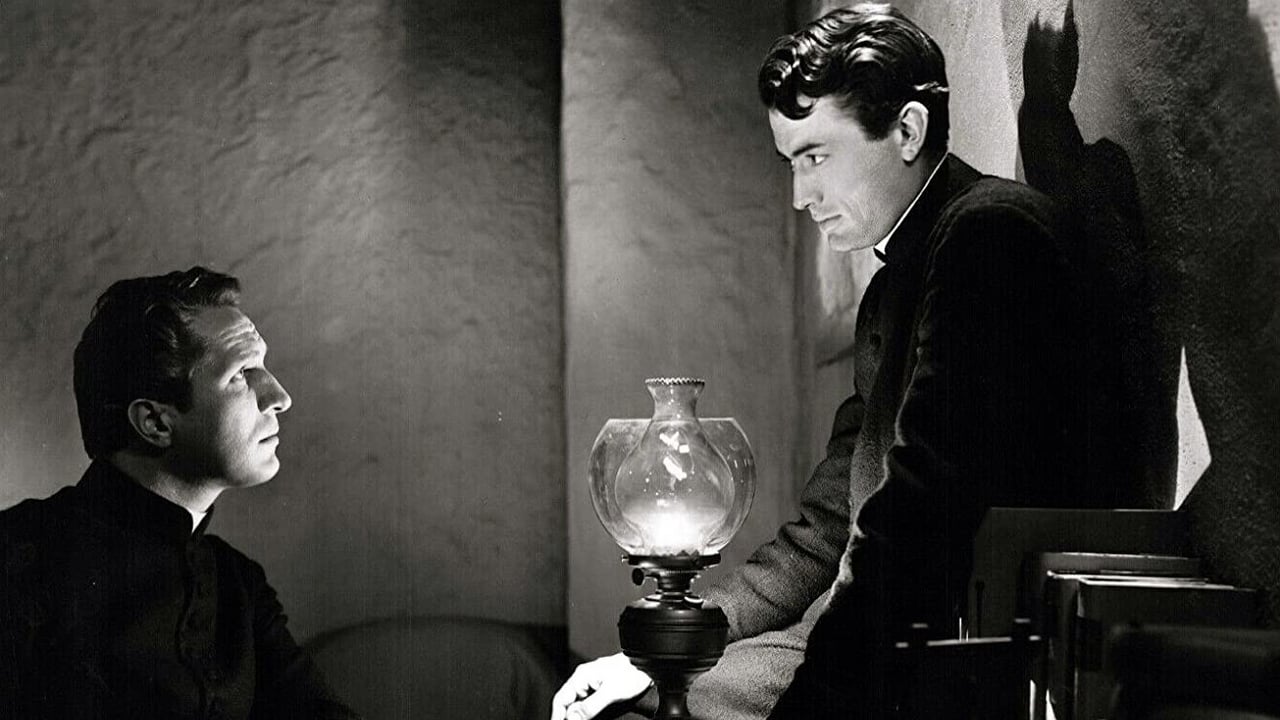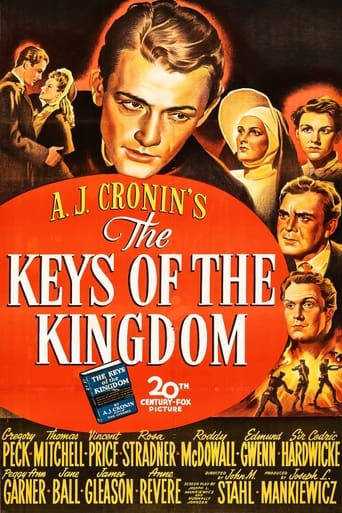



Just perfect...
It's a mild crowd pleaser for people who are exhausted by blockbusters.
View MoreThe movie turns out to be a little better than the average. Starting from a romantic formula often seen in the cinema, it ends in the most predictable (and somewhat bland) way.
View MoreThe storyline feels a little thin and moth-eaten in parts but this sequel is plenty of fun.
View MoreAlthough in part this is about missionaries in China and therefore could turn off anyone appalled by either religion or proselytizing (including me), the movie transcends those issues and is one of the great black and white Hollywood films of all time.Its greatness is carried by its variegated and compelling story, by the exquisite characterizations of its excellent actors, and by Gregory Peck's simple, powerful portrayal of a man who remains true to his character.Well-written and well-directed, the film requires only a modest suspension of disbelief for one to become enthralled, excited, and moved by this cross-section of history concentrated on the personal life, from childhood on, of a man whose goodness and idiosyncratic talents never leave one with any sense of sanctimony or piousness. Indeed, this man's capacity for survival and warmth help illuminate much of the hypocrisy and pomposity around him.There are grander, greater movies, of course, but this is a real find, and inspiring whether you are nine, nineteen, or ninety. Watch it alone, or with your family... give yourself to it and you will be rewarded.
View MoreGregory Peck plays Father Francis Chisholm, who has been given "The Keys to the Kingdom" in this sweeping 1944 film based on the famous novel by A.J. Cronin. Also starring are Thomas Mitchell, Edmund Gwenn, Sir Cedric Hardwicke, Vincent Price, Rosa Stradner and Roddy McDowell.The story is told in flashback as a monsignor (Hardwicke) reads Chisholm's journal of his 40 years as a missionary in China. Like most men who made films for 20th Century Fox that span a long period of time, Peck's character as a young man is played by Roddy McDowell. The journal tells of his parents' death and the love he has for the girl he grew up with, Nora, which keeps him from the vocation his aunt wants for him. Francis does, however, embrace the priesthood and is sent to China to start a mission. His live and let live philosophy is at odds with what the Church hierarchy wants - he doesn't rub elbows with the wealthy Chinese, whose conversion would bring in the peasants and whose generosity would help build his mission. He knows their conversions would be in name only; and he wants nothing to do with "rice Christians" who become Christians for food. Instead, he sets out to do God's work and blessings flow to him, and a wonderful mission, church and school are built. When a difficult nun (Stradner) arrives, Francis treats her with dignity and patience and eventually wins her loyalty and friendship.When revolution threatens the mission, Father Chisholm participates in bringing down the enemy. In short, he does what he knows to be true to himself, to his belief in God, and in the interests of his people.This is a truly magnificent film. As it went on, I asked myself, with varying things going on in the story but not a lot of big action scenes, what keeps the audience interested in such a movie. Characterizations. Real people. Relationships. Honesty regarding the human experience. You can find these elements in many films today, but don't look for those films to be released by the monolith studios, one of which released "The Keys to the Kingdom." Those films have 15- second scenes, huge special effects and characters scripted in shorthand. It takes a film like this to truly make one appreciate what Hollywood has lost. See this and then watch "Poseidon." It will have you running to TCM and Fox Movie Channel faster than anything else.Gregory Peck can best be described by the book "Growing up Catholic," in which there's a chapter called "Father What-a-Waste" where the authors lament the good-looking parish priest. Tall and handsome, Peck is totally believable as a good, gentle and determined man who follows Christ. There's a difference between playing a role and being the role - Peck IS Father Chisholm. Vincent Price is good as Francis' arrogant friend Angus, and Thomas Mitchell is terrific as an atheist doctor who is nevertheless Francis' best friend.Hardwicke brings great dignity to his role, and his voice as narrator is wonderful; and Edmund Gwenn, as Francis' mentor, is perfectly cast. Rosa Stradler plays the difficult nun, Maria-Veronique, an upper class woman who looks with disdain not only on Father Chisholm but the Chinese. The interesting thing about her performance is that at the end, as she plays the aging nun, she takes on the mannerisms and voice of an older woman. She's excellent.This would be my only criticism of Peck - while his character looks old, Peck still speaks and moves as a younger man.One of the best films to ever come out of Hollywood. Not sappy, not sentimental, just very powerful in its demonstration of what true goodness can achieve.
View MoreThis is an interesting story about a priest Father Francis Chisholm(Gregory Peck), who went to China to establish a parish. He never wanted to get money easily, for him was much more important to get more people really devoted to catholicism than to get funds from any people, and for this he made all efforts serving even as a doctor in the community. Another important aspect shown although not deep, was the difference among the priests. Some are humble like the hero of the film but others are arrogant and look more for the wealth of the church instead of looking for the wealth of poor people. Catholicism have lost many areas because of the lack of sacrifice of many of its priests otherwise it would reign nearly everywhere in the world. Priests like Father Chisholm would have been the salvation.
View MoreI've always loved this movie. My mother introduced me to it and its remained one of my favorites over the years. I find the character of Father Chisholm to be my ideal of what a priest should be. Kind, loving, humble and unpretentious. I don't think Peck ever surpassed himself. He is tremendous in the part. Ably written and directed, I think it is a superb film
View More